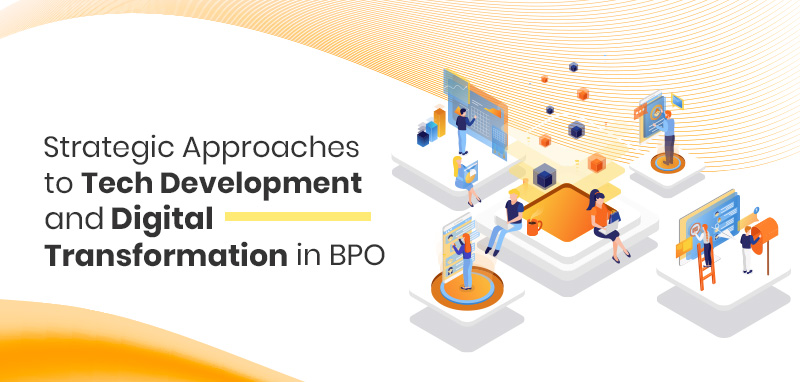Strategic Approaches to Tech Development and Digital Transformation in BPO
The Business Process Outsourcing (BPO) industry has experienced significant changes over the past few decades. With technological advancements and the advent of digital transformation, BPO companies have had to adapt and innovate to remain competitive. Strategic approaches to tech development and digital transformation have become essential in driving efficiency, improving customer service, and maintaining a competitive edge. This blog explores these strategic approaches, offering insights into how BPO companies can effectively navigate the digital landscape.

Understanding Digital Transformation in BPO
Digital transformation in BPO involves integrating digital technologies into all aspects of the business to fundamentally change how the organization operates and delivers value to customers. It encompasses the adoption of technologies such as artificial intelligence (AI), robotic process automation (RPA), cloud computing, big data analytics, and more. The goal is to enhance operational efficiency, improve customer experiences, and foster innovation.
Strategic Approaches to Tech Development
Embracing Automation and AI
One of the most significant strategic approaches in tech development for BPO is the adoption of automation and AI. These technologies can automate repetitive and mundane tasks, reducing human error and increasing efficiency. For instance, RPA can handle data entry, transaction processing, and customer queries, allowing human agents to focus on more complex tasks that require emotional intelligence and problem-solving skills.
AI-powered chatbots and virtual assistants can enhance customer service by providing quick and accurate responses to customer inquiries, thereby improving customer satisfaction. Moreover, AI can analyze large volumes of data to identify patterns and trends, enabling BPO companies to make data-driven decisions.
Leveraging Big Data and Analytics
Data is a valuable asset for BPO companies. Leveraging big data and analytics can provide actionable insights that drive strategic decisions. By analyzing customer interactions, transaction histories, and other relevant data, BPO companies can identify opportunities for process improvements, cost reductions, and enhanced customer experiences.
Predictive analytics, a subset of big data analytics, can forecast future trends and behaviors, allowing BPO companies to proactively address potential issues and capitalize on emerging opportunities. For example, predictive analytics can help in workforce management by predicting call volumes and optimizing staffing levels accordingly.
Enhancing Cybersecurity Measures
With the increasing reliance on digital technologies, cybersecurity has become a top priority for BPO companies. Ensuring robust cybersecurity measures is essential to protect sensitive client data and maintain trust. Strategic approaches to cybersecurity include implementing multi-factor authentication, encryption, regular security audits, and employee training on cybersecurity best practices.
Fostering Innovation through R&D
Investing in research and development (R&D) is crucial for continuous innovation in tech development. BPO companies should allocate resources to explore emerging technologies and develop innovative solutions that address specific industry challenges. Collaborating with technology partners, academic institutions, and startups can also drive innovation and bring fresh perspectives to the table.
R&D efforts can lead to the development of proprietary technologies and solutions that differentiate BPO companies from their competitors. For instance, creating custom AI algorithms tailored to specific client needs can provide a competitive advantage and deliver superior results.
Strategic Approaches to Digital Transformation
Developing a Digital Transformation Roadmap
A well-defined digital transformation roadmap is essential for guiding BPO companies through the digital journey. This roadmap should outline the goals, objectives, and key milestones of the digital transformation process. It should also identify the technologies to be adopted, the required resources, and the timeline for implementation.
Conclusion
Strategic approaches to tech development and digital transformation are vital for BPO companies to thrive in the digital age. By embracing automation and AI, implementing cloud solutions, leveraging big data and analytics, enhancing cybersecurity measures, fostering innovation through R&D, developing a digital transformation roadmap, cultivating a digital culture, enhancing customer experiences, optimizing business processes, adopting agile methodologies, partnering with technology providers, and investing in employee training and development, BPO companies can successfully navigate the digital landscape and achieve sustainable growth.
